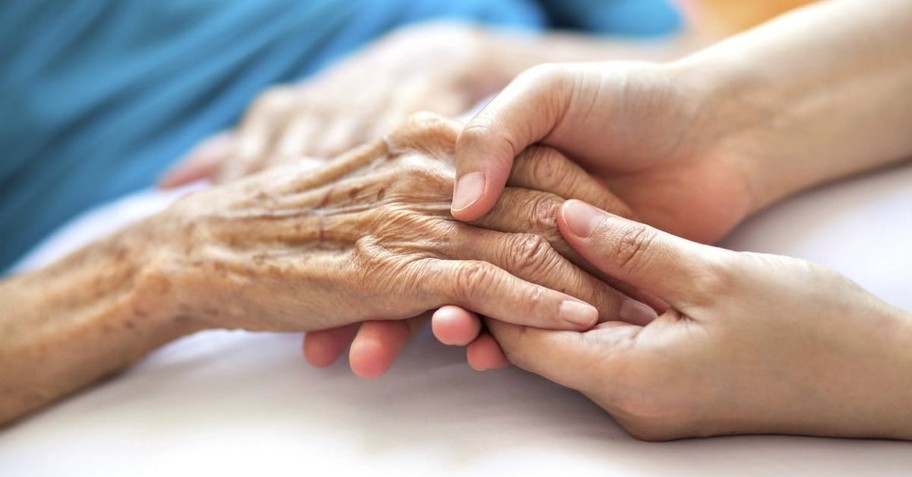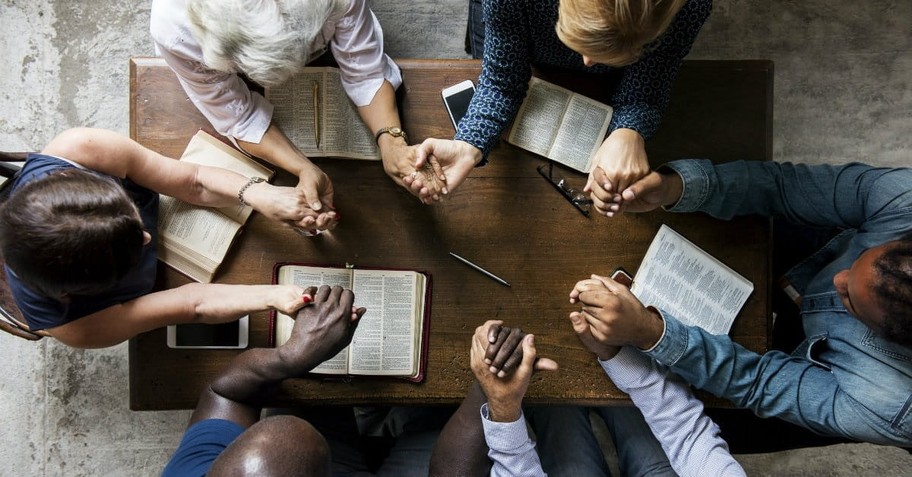Be a Helpful Helper: 4 Ways to Care for Others Facing a Personal Disaster

Two days after my diagnosis with cancer, I found myself back at the cancer center, being called into a wide room where I would receive my first PET scan. I was afraid to get the scan. Afraid they’d find the cancer had spread. Afraid I’d receive a death sentence.
The hospital tech gave me the instructions of what would happen, and when she stepped away, I felt the machine begin to move my body slowly toward the white cave. In that vulnerable moment, the image of my three girls’ faces flooded my consciousness. That’s when I realized: I have to tell my girls that Daddy has cancer.
With that single thought, picturing their innocent faces, something gave way inside me and my body began to quiver. No matter how much I tried to stop, my shoulders kept shaking. It wasn’t a polite little cry, either. It was deep, heaving, ugly sobbing, and I couldn’t stop. The nurse stopped the belt that had been loading me into the cave. In no hurry at all, this woman I’d known for all of ten minutes gently placed her hand on my left shoulder.
It was a sacred moment.
My body continued to shake, more of a mild tremor. Slowly removing her hand from my shoulder, the tech made eye contact and asked what was wrong.
“I’ve been diagnosed with cancer,” I explained, “and I just fell apart when I realized I have to tell my girls that Daddy has cancer.” I sniffed at the end, as a concluding punctuation.
Quietly she queried, “Do you think you can finish?”
“Yeah, I’ll try,” I promised. “I think I can do it.”
The fact that she’d been able to meet me right where I was, connecting in such a deep way, had helped me and I was beyond appreciative.
Photo Credit: ©Thinkstock/Darrin Klimek

Then the tide turned.
After the technician finished the scan she said, “You know, Jamie, God only tests the strong.”
Her words caught me off guard, I couldn’t believe what I was hearing. Her surety that the ill that had befallen me had been sent by God’s hand was a flagrant spiritual violation. However, having worked in disaster contexts for so long, I knew “my helper” was just trying to help. Or uttered these words because she didn’t know what else to say. While it was a wildly inappropriate thing to say to a patient, I tried to let it go.
Unfortunately, the medical technician’s insensitive comment wouldn’t be the only response that added to my suffering, rather than relieving it, during that season. I’d seen so many people, like this tech, whose hearts were in the right places, end up causing more harm than good by their actions and words.
In just the short time it took to complete the PET scan, one nurse had both comforted me and made an insensitive comment that would stay with me throughout my cancer journey.
It also got me thinking about how I treat others who are suffering.
For some, reaching out to someone in crisis is scary because you don’t want to say or do the wrong thing, but yet others might over-involve themselves in someone else’s pain, making things more difficult.
When you extend care to those who are suffering, be thoughtful about what you offer. Following are some ways you can make sure your help is actually helpful to others who may be facing a personal disaster.
Photo Credit: ©Unsplash/Yoann Boyer

Spiritual: Be an Ambassador of God’s Love and Mercy
“Is anyone among you suffering? Let him pray…”(James 5:13). Start by praying silently for your friend or loved one. Pray silently for God’s guidance over the situation, that you’d be guided in your thoughts and actions. You can also pray that God would bring relief, hope, and healing for the other person and for all affected by the tragic event.
Without pressuring the other person, you might also ask them if they would like you to pray for them. If they say yes, pray what comes naturally and from your heart. It’s okay if you muddle your way through your prayer. God will still listen. Don’t be tempted to turn your prayer into some mini-sermon. If the person declines, don’t force it or push it, respect their wishes.
Address spiritual questions, struggles, and issues with sensitivity.
Don’t implicate God in another’s suffering.
God is not the author of suffering. To suggest that God has inflicted suffering will likely be experienced by the sufferer as hurtful and possibly even violent. It can be tempting for people of faith to attempt to make meaning out of suffering by assigning its origin to God. Resist the temptation.
What someone facing a personal disaster most needs is to be reminded of God’s near presence and steadfast faithfulness—but not always with words. A gentle hug or a tender touch (when appropriate and welcomed) or offering to sit with them in the waiting room all communicate God’s reliable presence.
Remember that you don’t have to have all the answers. It is better to admit that you don’t know than to respond thoughtlessly. It’s perfectly fine to say you’ll think about their question, or pray about it, and then to consult with a pastor, church leader, or counselor first before answering any question you aren’t prepared to answer on your own. Be sure to circle back to their question, even if no answer is to be found.
Photo Credit: ©Thinkstock/Milkos

Emotional: Be Present—in the Moment—to the Sufferer
Covered only by a thin hospital gown, I was particularly physically and emotionally vulnerable when this “helper” engaged me. And although I wanted to give her the benefit of the doubt, excusing her behavior because she “meant well,” my heart broke for the other vulnerable ones who I knew had been treated the same.
It is natural to want to fill the void of pain or confusion or grief with words, activity, and other forms of “helping.” But often what a sufferer most needs is for you to be present to whatever he or she is experiencing in the moment. If she’s sad, reflect that sadness. If he’s confused, let him know you understand. Be present to the experience of the person who’s suffering.
And listening is more important than speaking, After the nurse touched my arm. I made a mental note to tell my psychology students how helpful the appropriate touch and patient listening had been for me. I’d always taught my students that, when warranted and invited, effective listening would be useful in their practice as well. I’d assure them that most people want to help but don’t know how—and that being present to another’s suffering, physically, emotionally, and spiritually, is what those in crisis need most.
Although a lot of people feel like they need to have all the “right” answers before they can help, people who are hurting need relationship itself more than they need certain words.
One of the greatest gifts someone can offer is to listen well and be present to another’s suffering.
That means demonstrating warmth and concern while turning off the part of your brain that’s paying more attention to what you’re thinking than to what’s being said. In some cases, letting another know that you hear and grasp the gravity of what they’ve been through might even mean crying with the other person.
We’d practice this when I’d taken students out in the field after a natural disaster. When engaging with women and men whose lives had been devastated by flood, fire, or hurricane, my students’ impulse—their natural human impulse—was to do something to fix the situation. And while there’s definitely a place for lacing up work boots and hauling away debris, other volunteers could do that.
What I most wanted my students to learn was how to listen well to those experiencing disaster and to be a steadfast loving presence to those whose lives felt so completely untethered.
Photo Credit: ©Thinkstock/Pablo K

Social: Be Willing to Walk Through Suffering Together
We need other people, especially in the midst of difficult life events like disasters. In its most basic form, social support simply means being there for others when they need someone to turn to for help. When we provide social support, we walk through suffering together as we seek a shared understanding of God’s love and grace.
Social support is a natural and helpful source of resilience for most people facing a personal disaster. It’s common for others going through a hardship to quickly find themselves pulling away from others. However, I’ve learned it is often when we want other the least is exactly when we need others the most. Though our tendency is to let our pain divide us, it can also unite us.
People vary in how much social support they feel that they need.
For example, some people need a lot of support from lots of people. Others need a lot of support from only a few deep relationships. In the same way, people vary in how they feel socially supported. Some people feel supported when others listen to them compassionately. Others feel supported when their loved ones help them out. Some people feel supported when others give them affirmation and encouragement.
Don’t assume you know the best way to help. Instead, ask how you might most helpful.
To make sure your social support is helping and not harming, be mindful to steer clear of clichés and making the situation all about you.
Photo Credit: ©Thinkstock/Rawpixel

Physical: Offer What a Person Most Needs
Ask others what would be most useful and helpful. Even if you’ve gone through something similar, remember each person’s experience of hardship is unique. Remember that not all help is helpful. If what your offering isn’t actually needed or wanted, it’s more likely to just add to the stress of what others are going through.
Whether it’s food, clothing, childcare or any other need, make sure that what you’re offering is really what another needs or wants.
Before bringing a casserole, check to see if a family’s fridge is already crowded with them.
Before bringing clothing to a family in the wake of a house fire, check to see what their specific needs are.
Before promising children ice cream and a movie, quietly ask the parents if they’d like time alone in the house, or whether they need time with their kids.
Offer what is most needed.
Caring for other’s physical needs can also be an opportunity to gift the familiar. For example, I had periods where it wasn’t safe for me to be in public because the chemotherapy had weakened my immune system. This meant I couldn’t visit my favorite coffee shop. One of my friends texted to see if they could pick me up a cup of dark roast from there while they were out running errands.
Granted I didn’t need coffee to survive physically. But as I sat at home, slowly sipping the hot coffee, I noticed the cups warmth in my hands, smelled the notes of chocolate from the dark roast beans wafting in the air, this familiar physical act helped take my mind of the pain radiating through my body that often consumed my awareness, even if only for a moment.
Being present to someone else who is suffering isn’t easy. But you love others well when you begin by seeing and hearing them, and letting their cues lead you. And if you’ve been on the receiving end of “help” that is less than helpful, releasing these unintended offenses lays the groundwork in you for future health and wellness.
Dr. Jamie Aten is the founder and executive director of the Humanitarian Disaster Institute and Blanchard Chair of Humanitarian & Disaster Leadership at Wheaton College in Wheaton, Illinois. He is the author of A Walking Disaster: What Katrina and Cancer Taught Me About Faith and Resilience (Templeton Press). Follow on Twitter at @drjamieaten or visit his website jamieaten.com.
Photo Credit: ©Unsplash/Braden Collum
Originally published February 11, 2019.





